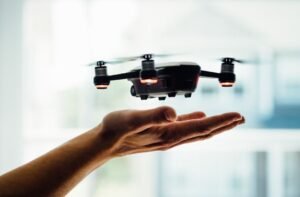Artificial Intelligence (AI) is a rapidly evolving field with a wide range of applications and uses across various industries. From healthcare to finance and agriculture to marketing, AI is transforming the way businesses operate and making significant contributions to our daily lives. In this article, we will explore some of the key applications and uses of AI, providing insights into how this technology is changing the world around us.
**Key Takeaways:**
– AI has diverse applications across industries such as healthcare, finance, agriculture, and marketing.
– It is transforming businesses by automating tasks, improving efficiency, and enhancing decision-making processes.
– AI is making significant contributions to healthcare, including disease diagnosis and personalized treatment plans.
– The finance industry is utilizing AI for fraud detection, risk assessment, and algorithmic trading.
– AI technology is revolutionizing agriculture by enabling precision farming and crop monitoring.
– In the marketing realm, AI is used for sentiment analysis, customer segmentation, and chatbots.
Healthcare is one of the sectors benefiting greatly from AI advancements. AI-powered diagnostic systems can analyze medical images and provide accurate results, assisting doctors in detecting diseases like *cancer* at an early stage. *Doctors and AI working together can achieve higher accuracy in diagnosing diseases faster, ultimately leading to improved patient outcomes*. Additionally, AI algorithms can predict patient outcomes based on data patterns, helping in personalized treatment plans and disease management.
The finance industry is leveraging AI for a range of applications. Fraud detection algorithms analyze vast amounts of data, identifying suspicious patterns and potential fraudulent activities, *protecting customers and financial institutions from malicious actors*. Risk assessment models use AI to evaluate creditworthiness, enhancing the accuracy of lending decisions. Algorithmic trading, powered by AI, enables faster and more efficient trading, utilizing real-time market data and complex algorithms to make informed investment decisions.
Agriculture, too, is benefiting from AI technology. Precision farming techniques utilize AI-enabled sensors and machine learning algorithms to optimize crop management practices. By monitoring soil conditions, weather patterns, and plant health in real-time, farmers can make data-driven decisions to maximize crop yield and minimize resource wastage. *AI in agriculture can play a vital role in combating food shortages and ensuring sustainable farming practices*.
In the marketing domain, AI has become increasingly important for businesses. Sentiment analysis algorithms scan social media data, customer reviews, and feedback to gauge public opinion about products and services. This information helps companies improve their offerings and understand customer preferences. AI-powered chatbots provide instant support and assistance to customers, enhancing customer service and reducing response times.
To illustrate the impact of AI in various industries, let’s examine a few key statistics:
Table 1: AI Applications and Impact
| Industry | AI Applications | Impact |
|————–|——————————|————————————-|
| Healthcare | Disease diagnosis | Early detection of diseases |
| Finance | Fraud detection | Enhanced security for transactions |
| Agriculture | Precision farming | Improved crop yield and resource use|
| Marketing | Sentiment analysis | Better understanding of customers |
Table 2: AI in Healthcare Predictions
| AI Application | Prediction |
|———————|————————————————–|
| Diagnostics | 90% accuracy in diagnosing diseases by 2030 |
| Personalized Care | Customized treatment plans for every patient |
| Disease Management | Cut healthcare costs by 25% through AI interventions|
Table 3: AI Impact on Marketing
| AI Application | Impact |
|———————|————————————————–|
| Customer Segmentation | Effective targeting for personalized marketing |
| Chatbots | 24/7 support and improved customer satisfaction |
| Sentiment Analysis | More accurate understanding of customer preferences|
In conclusion, AI technology is revolutionizing industries across the board, from healthcare and finance to agriculture and marketing. By automating tasks, improving efficiency, and enhancing decision-making processes, AI is driving innovation and transforming the way we live and work. With continued advancements, the potential applications and uses of AI are boundless, making it an exciting field that will shape our future.

Common Misconceptions
Misconception 1: AI is only used in advanced technological applications
One common misconception about AI applications and uses is that they are limited to advanced technological sectors. However, AI is now being employed in a wide range of industries and everyday products.
- AI is used in healthcare to analyze medical data and assist in diagnosis.
- AI is utilized in e-commerce for personalized product recommendations.
- AI is applied in transportation to optimize traffic flow and improve safety.
Misconception 2: AI will replace human jobs entirely
Another prevailing misconception is that AI will completely replace human jobs. While AI does have the potential to automate certain tasks, it is more likely to complement human capabilities rather than replace them.
- AI can perform repetitive and mundane tasks, freeing up humans to focus on higher-level work.
- AI can assist professionals by providing valuable insights and data analysis.
- AI can create new job opportunities by enabling the development of innovative products and services.
Misconception 3: AI is infallible and always makes the right decisions
One misconception that needs debunking is the belief that AI is infallible and always makes the correct decisions. The truth is that AI systems are not immune to errors or biases.
- AI can be susceptible to biases present in the data it is trained on.
- AI algorithms may produce unexpected or incorrect results in certain situations.
- AI relies on human oversight and accountability to ensure ethical and accurate outcomes.
Misconception 4: AI is only beneficial for large corporations
Many people wrongly assume that AI is only beneficial for large corporations with substantial resources. However, AI technologies have become increasingly accessible and affordable for organizations of all sizes.
- Small businesses can utilize AI chatbots to enhance customer support and engagement.
- AI-powered analytics tools can provide valuable insights for startups and entrepreneurs.
- AI solutions can automate routine tasks, improving efficiency and cost-effectiveness for any organization.
Misconception 5: AI will eventually become self-aware and take over the world
The Hollywood-fueled misconception that AI will become self-aware and dominate the world is not grounded in reality. AI systems are designed with specific functionalities and are not capable of achieving sentience or consciousness.
- AI technologies are created by humans and follow predefined algorithms.
- AI systems lack self-awareness and cannot possess intentions or desires.
- AI operates within the boundaries set by human designers and programmers.

AI Applications and Uses in Healthcare
Artificial Intelligence (AI) is revolutionizing the healthcare industry by improving diagnostics, drug discovery, and patient care. The following table showcases some remarkable applications of AI in healthcare.
| Application | Description |
|---|---|
| Medical Imaging Analysis | AI algorithms can analyze medical images like X-rays, enabling early detection of diseases. |
| Drug Discovery | AI models can accelerate the drug discovery process by predicting the effectiveness of potential treatments. |
| Virtual Nursing Assistants | AI-powered virtual assistants help answer patients’ questions and provide personalized healthcare guidance. |
| Patient Monitoring | AI systems can monitor patients remotely, detecting abnormal conditions and alerting healthcare providers. |
| Robot-Assisted Surgery | AI-enabled robotic systems enhance surgical precision and offer minimally invasive procedures. |
AI Applications in Finance
The financial sector is leveraging AI capabilities to streamline operations, improve risk assessment, and enhance customer experiences. The table below highlights some intriguing applications of AI in finance.
| Application | Description |
|---|---|
| Algorithmic Trading | AI-powered algorithms execute trades based on predefined parameters, optimizing investment strategies. |
| Fraud Detection | AI systems aid in identifying fraudulent activities by analyzing patterns and anomalies in transactions. |
| Robo Advisors | AI-powered robo advisors provide automated investment recommendations aligned with clients’ risk profiles. |
| Credit Scoring | AI models analyze credit history to determine creditworthiness, enabling faster and more accurate loan decisions. |
| Chatbot Customer Support | AI-driven chatbots assist customers with inquiries, reducing response times and improving user satisfaction. |
AI Applications in Education
Artificial Intelligence has the potential to transform and personalize education by providing adaptive learning platforms and intelligent tutoring systems. Explore the table below for notable AI applications in education.
| Application | Description |
|---|---|
| Adaptive Learning | AI systems adapt educational content to individual students’ learning pace, facilitating personalized learning experiences. |
| Automated Grading | AI algorithms grade exams and assignments, saving teachers substantial time and effort. |
| Intelligent Tutoring | AI-powered virtual tutors provide targeted instruction, tailored to students’ specific needs and preferences. |
| Plagiarism Detection | AI tools compare students’ work with a vast database, identifying potential instances of plagiarism. |
| Natural Language Processing | AI systems analyze written text to enable automatic language translation and text comprehension for language learners. |
AI Applications in Retail
AI is reshaping the retail industry, enabling personalized marketing, optimizing inventory management, and improving customer experiences. Discover the remarkable AI applications in retail through the table below.
| Application | Description |
|---|---|
| Product Recommendations | AI algorithms analyze customer behavior to recommend targeted products, increasing sales and customer satisfaction. |
| Inventory Management | AI systems predict demand patterns, optimizing stock levels and reducing costs associated with overstocking or stockouts. |
| Visual Search | AI-powered visual search technology allows customers to search for products using images, enhancing their shopping experience. |
| Chatbot Assistants | AI chatbots provide instant customer support, answering queries and assisting in the purchasing process. |
| Price Optimization | AI models analyze market conditions and competitor pricing data to optimize product pricing strategies for maximum profitability. |
AI Applications in Transportation
Artificial Intelligence is transforming transportation systems, optimizing route planning, enhancing safety measures, and facilitating autonomous vehicles. Explore the applications of AI in transportation through the following table.
| Application | Description |
|---|---|
| Traffic Management | AI systems analyze real-time traffic data to optimize traffic flow and reduce congestion. |
| Autonomous Vehicles | AI enables self-driving cars to navigate roads, improving road safety and increasing transportation efficiency. |
| Ride-Hailing Optimization | AI algorithms optimize ride-hailing services by matching drivers and passengers efficiently, reducing wait times and costs. |
| Predictive Maintenance | AI models predict maintenance needs for vehicles and ensure timely repairs, minimizing breakdowns and associated costs. |
| Cargo Route Optimization | AI algorithms optimize delivery routes, minimizing transportation costs and improving delivery timeframes. |
AI Applications in Agriculture
Agriculture can benefit greatly from AI applications, optimizing crop production, monitoring crop health, and reducing resource waste. The table below showcases intriguing applications of AI in agriculture.
| Application | Description |
|---|---|
| Precision Farming | AI systems utilize sensors and data analysis to optimize water and fertilizer usage, increasing crop yields. |
| Crop Disease Detection | AI algorithms analyze crop images to detect diseases early, enabling targeted treatment and preventing widespread damage. |
| Robotic Harvesting | AI-enabled robots automate the harvesting process, improving efficiency and reducing labor costs. |
| Weather Forecasting | AI models utilize historical and real-time data to provide accurate weather forecasts, aiding in crop management decisions. |
| Livestock Monitoring | AI systems monitor animal behavior, health, and feeding patterns, enabling early detection of abnormalities. |
AI Applications in Manufacturing
AI is transforming the manufacturing sector by optimizing production processes, reducing downtime, and improving product quality. Explore the applications of AI in manufacturing through the table below.
| Application | Description |
|---|---|
| Quality Control | AI systems identify defects and anomalies in products, ensuring only high-quality items reach the market. |
| Predictive Maintenance | AI models predict equipment failures, allowing maintenance to be scheduled proactively and avoiding costly downtime. |
| Supply Chain Optimization | AI algorithms optimize supply chain logistics, reducing costs and optimizing delivery schedules. |
| Robotic Process Automation | AI-powered robots automate repetitive tasks on the assembly line, improving efficiency and reducing errors. |
| Energy Management | AI systems analyze energy usage patterns to optimize energy consumption and reduce manufacturing costs. |
AI Applications in Entertainment
The entertainment industry is utilizing AI applications to personalize recommendations, enhance content creation, and improve user experiences. Discover some fascinating AI applications in entertainment through the table below.
| Application | Description |
|---|---|
| Content Recommendations | AI algorithms analyze user preferences to recommend movies, music, and TV shows suited to individual tastes. |
| Emotion Recognition | AI models can recognize emotions from facial expressions, enabling interactive and emotionally responsive experiences. |
| Virtual Reality (VR) | AI enhances VR experiences by enabling realistic simulations and adaptive interactions with virtual environments. |
| Content Creation | AI systems generate music, artwork, and scripts autonomously, pushing the boundaries of creativity in entertainment. |
| Live Event Augmentation | AI technologies enhance live events through real-time translation, augmented reality, and personalized attendee experiences. |
AI Applications in Security
AI plays a crucial role in security applications, assisting in threat detection, surveillance, and biometric identification. The table below highlights some noteworthy AI applications in security.
| Application | Description |
|---|---|
| Facial Recognition | AI algorithms identify individuals by matching facial features to stored datasets, enhancing security and preventing unauthorized access. |
| Video Analytics | AI systems analyze video footage in real-time, identifying suspicious behaviors and events, contributing to crime prevention. |
| Intrusion Detection | AI-powered sensors detect and alert authorities to potential trespassing or unauthorized access attempts. |
| Threat Intelligence | AI models analyze vast amounts of data to identify potential security vulnerabilities and anticipate cyber-attacks. |
| Smart City Security | AI technologies enhance security in urban areas, utilizing data analytics and surveillance to monitor public spaces. |
Artificial Intelligence is revolutionizing various industries, transforming operations, and enhancing customer experiences. From healthcare and finance to education and entertainment, AI applications are revolutionizing the way we live and work. With the ability to analyze vast amounts of data and make autonomous decisions, AI has the potential to continue driving significant advancements and shaping the future.
Frequently Asked Questions
AI Applications and Uses
Question 1: What are some examples of AI applications being used today?
Answer: AI is being applied in various industries such as healthcare, finance, transportation, and retail. Some examples include medical diagnosis, fraud detection, autonomous vehicles, and personalized recommendations.
Question 2: How is AI being used in healthcare?
Answer: In healthcare, AI is used for tasks like disease diagnosis, drug discovery, and personalized medicine. AI algorithms can analyze complex medical data and images, helping doctors make more accurate diagnoses and providing tailored treatment options.
Question 3: What is the role of AI in finance?
Answer: AI in finance enables automated processes, risk assessment, fraud detection, and algorithmic trading. It can help financial institutions make better investment decisions by analyzing vast amounts of data and predicting market trends.
Question 4: Can AI be used for customer service?
Answer: Yes, AI-powered chatbots and virtual assistants are being used for customer service, providing timely responses, personalized recommendations, and assisting customers with inquiries or issues.
Question 5: How is AI utilized in transportation?
Answer: AI is used in self-driving cars, traffic management systems, and logistics optimization. Autonomous vehicles employ AI algorithms to navigate and make real-time decisions, improving road safety and optimizing transportation routes.
Question 6: What are the applications of AI in retail?
Answer: AI is used in retail for inventory management, personalized marketing, and virtual shopping assistants. AI algorithms can analyze customer preferences, predict demand, and provide personalized product recommendations.
Question 7: How can AI be utilized in cybersecurity?
Answer: AI is used in cybersecurity for threat detection, anomaly detection, and network security monitoring. Machine learning algorithms can analyze large quantities of data to identify patterns and potential security breaches.
Question 8: What are the benefits of using AI in manufacturing?
Answer: AI in manufacturing can optimize production processes, improve quality control, and enhance predictive maintenance. By analyzing real-time data, AI algorithms can identify inefficiencies, reduce downtime, and predict equipment failures.
Question 9: Can AI be used for natural language processing?
Answer: Yes, AI is extensively used in natural language processing (NLP). NLP techniques enable machines to understand, interpret, and respond to human language, facilitating applications such as voice assistants, translation services, and sentiment analysis.
Question 10: How is AI being used in agriculture?
Answer: AI is used in agriculture for crop monitoring, irrigation management, and yield prediction. Remote sensors, drones, and AI algorithms can analyze data to optimize farming practices, reduce resource wastage, and increase crop productivity.





